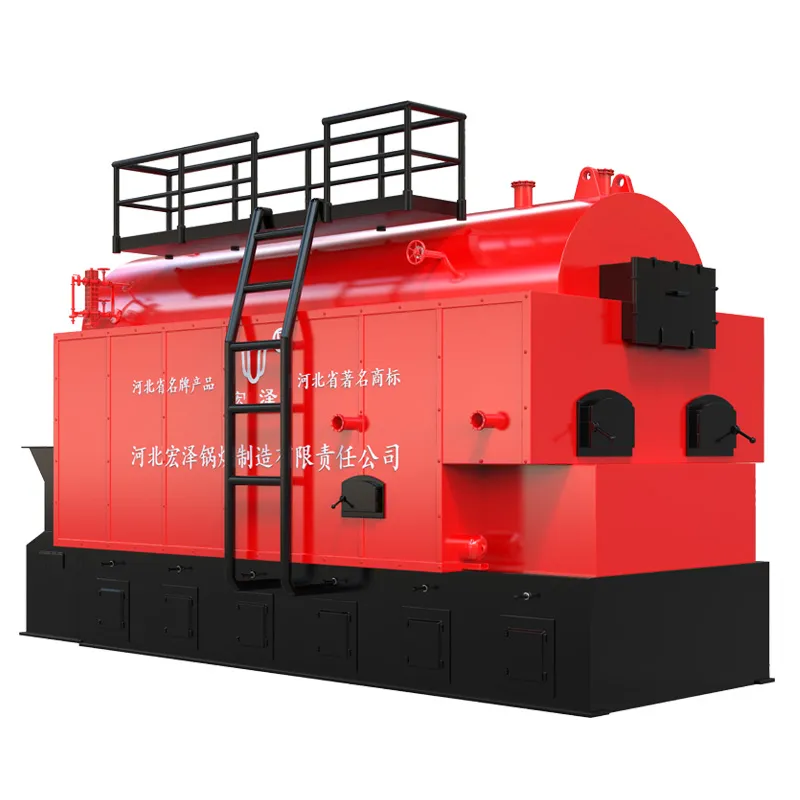
Oct . 18, 2024 11:51 Back to list
Thermal Fluid Heating Systems for Efficient Industrial Boiler Applications
Understanding Thermic Fluid Oil Boilers Efficiency and Applications
Thermic fluid oil boilers, also known as thermal fluid heaters, play a vital role in various industrial processes where precise temperature control is crucial. These specialized boilers utilize a heat transfer fluid instead of water or steam to transport heat from a heating source to various processes and equipment. As industries evolve and pursue greater efficiency, thermic fluid boilers are increasingly adopted across diverse sectors.
The Working Principle
The core operation of a thermic fluid oil boiler revolves around its ability to heat a synthetic organic fluid—commonly referred to as thermal oil—via a heat exchanger. This thermal oil has a high boiling point, which enables it to carry heat at a much higher temperature than water or steam, typically reaching temperatures of up to 350°C (662°F) and, in some advanced systems, even higher.
In a thermic fluid boiler, a burner heats the thermal fluid in a closed-loop system. The heated fluid then circulates through a heat exchanger, transferring its thermal energy to various applications, such as reactors, ovens, or drying equipment. Once the fluid releases its heat, it returns to the boiler to be reheated, completing the cycle.
Advantages of Thermic Fluid Oil Boilers
1. High Efficiency Thermic fluid boilers operate at a high thermal efficiency, often exceeding 90%. This efficiency translates into lower energy costs and reduced greenhouse gas emissions, making them an environmentally friendly choice.
2. Temperature Control The ability to achieve and maintain consistent high temperatures without the risks associated with steam systems allows for precise control in applications like chemical processing, food production, and plastics manufacturing.
3. Safety The use of thermal oil minimizes the risks of explosions and pressure-related accidents that are often associated with steam boilers. This safety feature is especially important in industries handling hazardous materials.
4. Versatility Thermic fluid oil boilers can be used in a wide array of applications, proving valuable in sectors such as pharmaceuticals, textiles, automotive, and even renewable energy systems.
thermic fluid oil boiler

5. Lower Maintenance Needs Compared to traditional steam boilers, thermic fluid systems generally require less maintenance. The absence of high-pressure steam reduces wear and tear, leading to longer operational lifespans and decreased downtime.
Applications of Thermic Fluid Oil Boilers
Thermic fluid oil boilers find applications in multiple industries due to their unique capabilities.
- Chemical Processing In chemical plants, precise temperature management is critical. Thermic fluid systems ensure that reactions occur under optimal temperatures and conditions, which can enhance yield and product quality.
- Food and Beverage In the food industry, thermal fluid heaters are often used for cooking, drying, and pasteurizing processes. The controlled heating prevents overcooking and improves product safety and consistency.
- Plastic and Rubber Manufacturing The production of plastics often necessitates high temperatures for processes like molding and extrusion. Thermic fluid boilers provide the necessary heat without the fluctuations often associated with steam systems.
- Pharmaceuticals The pharmaceutical industry relies heavily on controlled environments. Thermic fluid systems provide the steady heat needed for sterilization processes, ensuring product safety and efficacy.
- Renewable Energy In solar thermal plants, thermic fluid systems play an essential role in capturing and transferring solar energy, converting it to heat energy that can be used to generate electricity or for other heating applications.
Conclusion
As industries continue to adapt to new efficiency standards and environmental regulations, thermic fluid oil boilers stand out as a beneficial solution. Their ability to provide high efficiency, precise temperature control, and enhanced safety makes them an attractive option for various applications. Whether in chemical processing, food production, or renewable energy, thermic fluid boilers represent a modern approach to industrial heating, ensuring that businesses operate smoothly and sustainably. As technology progresses, these systems will likely become even more efficient, paving the way for a greener future in industrial heating.
-
High-Efficiency Commercial Oil Fired Steam Boiler for Industry
NewsJul.30,2025
-
High-Efficiency Biomass Fired Thermal Oil Boiler Solutions
NewsJul.30,2025
-
High Efficiency Gas Fired Thermal Oil Boiler for Industrial Heating
NewsJul.29,2025
-
High-Efficiency Gas Fired Hot Water Boiler for Sale – Reliable & Affordable
NewsJul.29,2025
-
High Efficiency Biomass Fired Hot Water Boiler for Industrial and Commercial Use
NewsJul.29,2025
-
High-Efficiency Biomass Fired Hot Water Boiler for Industrial Use
NewsJul.28,2025
Related PRODUCTS






















